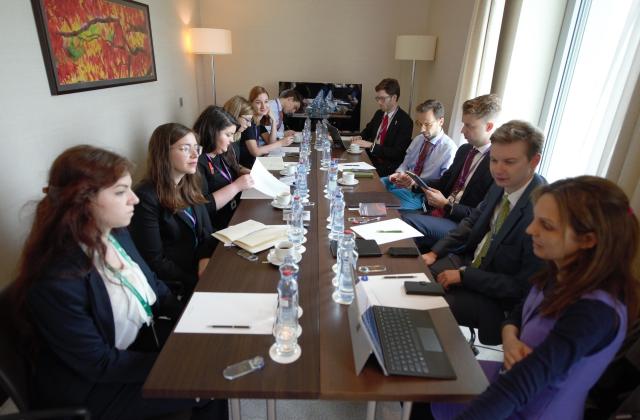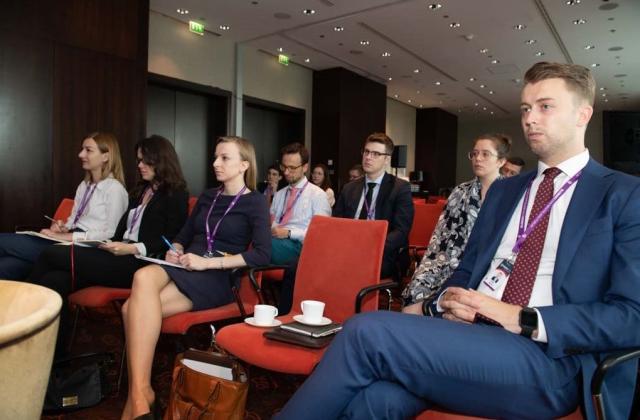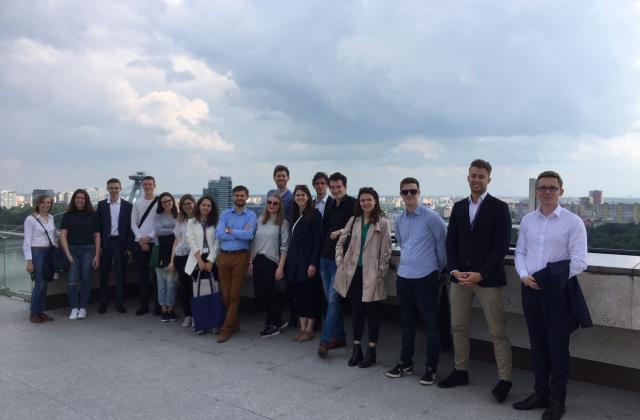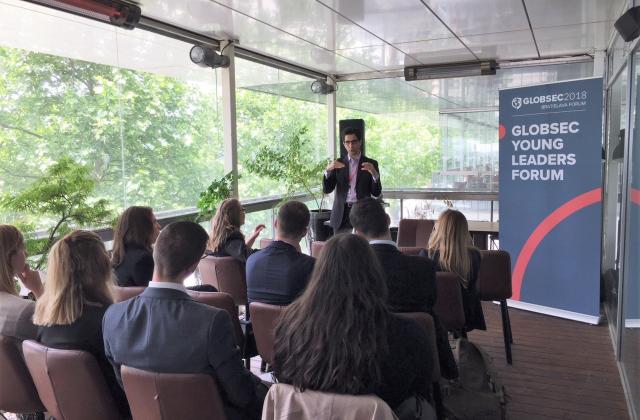GLOBSEC Young Leaders Forum 2018
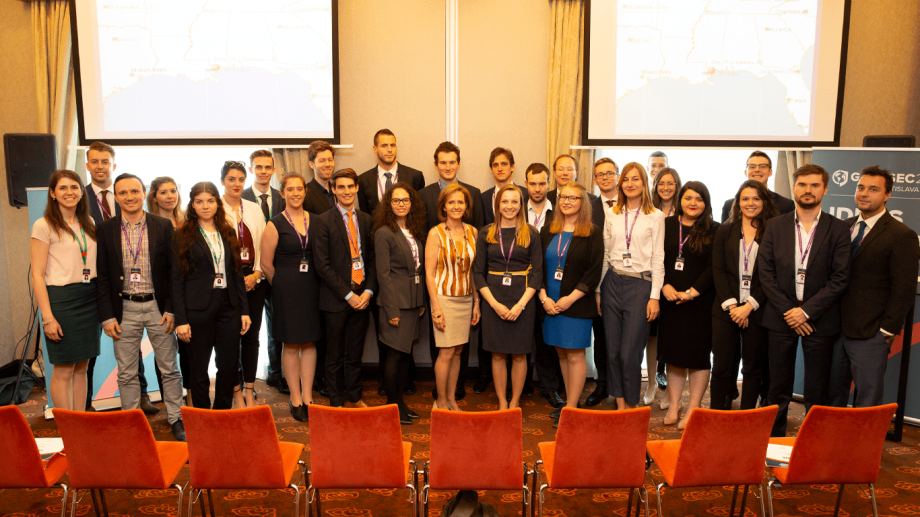
This year’s GLOBSEC Young Leaders Forum (GYLF) welcomed a truly global list of participants from academia, business, non-governmental organisations, think tanks and more. What follows is a summary of their activities, as well as their participation in and contributions to GLOBSEC 2018 Bratislava Forum.
Welcome to Bratislava!
The Forum kicked off on 16 May with a visit to Bratislava Castle and the ‘100 Years of Czechoslovakia’ exposition. Later in the day, GYLF participants we were joined by Ambassador Rastislav Káčer, President of GLOBSEC Róbert Vass, GLOBSEC Policy Institute (GPI) Director Jakub Wiśniewski and Deputy Research Director Alenka Kudzko for a welcome dinner.
Busy Second Day
Day 2 began with a series of GYLF working group discussions. How can states protect democratic freedoms in the face of cyber threats was the topic for the ‘Cyber Security’ group. The group was led by GYLF alumni Maria Mundt, while the Honourable Marina Kaljurand and Alexander Klimburg delivered the opening remarks.
The ‘Sustainable Societies’ working group explored ways in which governments and corporations can encourage more environmentally conscious citizens. Led by Andrej Nosko, Assistant Professor at the Faculty of Political Sciences and International Relations at Matej Bel University in Banská Bystrica, the group came up with ideas for solutions which can help shape the future of societies in a sustainable manner. These include:
- Companies could create products that last longer and reuse old materials for new products
- The right to repair, which would also extend the product life cycle
- Local governments could set up so called Libraries of Things. The idea behind this is that a lot of products, such as lawn mowers, are only used a couple of times a year. Libraries of Things would enable people to borrow such products and thus save a lot of money.
- Rethinking product design (e.g. reusable cups for take-away coffee), which could positively impact business plans
The ‘Future of Europe’ group was introduced by Christal Morehouse, former Senior Policy Officer at the Open Society Foundations, before another GYLF alumni Igor Merheim-Eyre from the International Republican Institute addressed grievances that drive anti-European sentiments.
After lunch, our participants continued their discussion on anti-European sentiments, which formed the first GYLF exclusive session on disinformation and its impact on liberal democracy. This was led by the GPI’s Katarína Klingová and featured Igor Merheim-Eyre, a Research Fellow at the University of Kent, and former GYLF alumni Maria Mundt.
This lively discussion was followed by an all-female panel in which the GPI’s Anushka Kaushik talked with Melissa Hathaway and Latha Reddy about the interplay between public and private responses to cyber threats. It was agreed that because governments do not have the capacity to fund industry to the same level as the private sector, corporations play an inevitable part in the international cyber environment, and their responsibility within the international rules-based order is mandatory.
The day was concluded by GLOBSEC City Talks, where GYLF participants had the opportunity to join a discussion on Euroscepticism with Maroš Šefčovič, Ivan Korčok and Paul Schmidt. Members of the audience were treated to a particularly lively debate in which Šefčovič emphasised the importance of young people carrying on the message of keeping Slovakia in the democratic corridor. One of our young leaders, YATA International’s John Jacobs, joined the discussion by emphasising that nationalists always claim the successes but blame EU for the failures. How do we redress the balance and restore trust in our democracies as well as the EU?
In response, Korčok emphasised that politicians must identify and communicate the EU’s agenda to the wider public. These include the citizens of smaller EU member states. To this end, Cristina Cefai, a Maltese citizen who works for the EU Parliament, challenged the idea that small nations do not matter and should not care about such issue. As she sees it, it’s all about how these states are engaged, an idea that Korčok very much supported.
This was followed by the GLOBSEC Cocktail, where our City Challenge winners were formally awarded by Matej Bošňák, the country managing partner of EY, the official sponsor of the competition.
A Diverse Day 3
The final day began with a series of main panels, the most notable being on the role of 21st century companies in achieving the United Nations’ Sustainable Development Goals (UNSDGs). It was followed by a chat session with Jeff Moss, Founder and CEO of DEF CON, which focused on the capability of secure technologies to actually be secure.
We returned to cyber space in the next session, which was led by the GPI’s Stanislav Matějka, an important member of our Crime-Terror Nexus project. The discussion revolved around online radicalisation – a phenomenon that has its roots in the offline world. During the session, Erin Marie Saltman, Facebook’s Lead Policy Manager for Counterterrorism and Countering Violent Extremism and Vice News Ben Makuch stressed that ‘one does not simply go to buy shoes online and accidentally become a jihadist’. Put simply, radicalisation always starts with a grievance or an interest in the offline space.
Some GYLF partipants also joined Erin’s and Ben’s main Forum session on remote-controlled terrorism, while members of the ‘Future of Europe’ working group presented their points of view in a panel discussion on the threat of populism. Economic uncertainty, a deep mistrust in politics and fragile democracies were highlighted as factors behind the surge of populism in Central and Eastern Europe. On behalf of the GYLF working group, Alexis Leenders also asked how, in an era of uncertainty, can we create a narrative about the EU that is more inclusive and forward looking? Martina Larkin responded by saying that Europe’s younger generations must be specifically targeted by this new narrative, while the GPI’s Jakub Wisniewski stressed that we need to make the EU message shorter, clearer and more vulgar. Put simply, the EU needs to communicate the and not just the ideas.
The formal part of the day ended with a discussion on the EU’s Eastern Neighbours, led by GYLF participant Sandra Jelisavčić. This was also hosted by Jana Kobzová, Head of Policy at Rassmussen Global and an Associate Policy Fellow at the European Council of Foreign Relations, Dovilé Šukyté, GYLF alumni and Acting Director of the Eastern Europe Studies Center in Lithuania, and Ján Cingel, GPI’s Acting Head of European Neighbourhood Programme. Jana Kobzová elegantly summed up proceedings by saying that when it comes to the Eastern Partnership, we need to think ‘less Eastern, more partnership.’
Final Food for Thought
GLOBSEC Young Leaders Forum 2018 concluded with three important contributions. The first was a discussion on the meaning and effects of the #WeAreNato campaign. Gerlinde Niehus, Head of NATO PDD, was joined by Miroslav Mizera from the Slovak Ministry of Defence and John Jacobs from YATA International. Second, the ‘Cyber Security’ working group contributed to the main Forum discussion on Cyber Threats to Democracy. This session emphasised that while efforts to undermine and delegitimise democracy are nothing new, technologies are increasingly accelerating the process. As the discussion moved to the issue of fake news Sandra Jelisavčić asked the panellists what should be if threats emanate not from a foreign actor but government officials sharing fake news. Samir Saran reacted by saying that ‘once you created the market for perversion of personal information, then any actor could use that market space.’ Marietje Schaake cautioned that there is a difference between the subversive actions of a foreign or domestic power, and disinformation. She also highlighted the need for checks, balances and education, especially when it comes to ‘deep fake’ images and information.
GYLF was officially closed by Kathleen Koch, an author, journalist, and founder of LeadersLink, who delivered an inspirational session on lessons she has learned throughout her career about leadership.
What’s Next?
Two months on and our GYLF 2018 participants are busy working on policy papers on themes they discussed in their respective working groups. The papers will be published in the autumn edition of GLOBSEC Magazine. Stay tuned!
We are also happy to report that one of our participants, Rachel Rizzo has been awarded the prestigious 2018-2019 Bacevich Fellowship, while Jessica Coffi, a GYLF 2017 alumni and YATA executive, collaborated with former heads of intelligence services on the current best selling book in France. Rachel and John Jacobs were also present for deliberations at the NATO Brussels Summit.
For more news and publications by the GYLF alumni network, follow our participants on twitter or LinkedIn!
This year’s participants
- Cristina Baraganescu, Project Officer at the European Commission
- Reiner Bergema, Strategic Analyst, The Hague Centre for Strategic Studies
- Mads Andreas Danielssen, Senior Executive Officer, ARENA Centre for European Studies, University of Oslo
- Simon Fisher, Policy Officer, Department of Defence, Australian Government
- Pawel Fleischer, President and CEO of the Institute for Forecasting and International Studies
- Alice-Billon Galland, Policy Fellow, European Leadership Network
- Dominik Hatiar, EU Affairs Analyst, Equinor
- Benjamin Hofmann, Able Seaman Combat Systems Operator, Royal Australian Navy
- John Jacobs, President of YATA International
- Sandra Jelisavčić, Project Manager, Brasidas Group
- Arta Jusufi, Project Manager, United Nations Development Programme
- Katarína Kertyšová, Strategic Analyst, The Hague Centre for Strategic Studies
- Alexis Leenders, Wilfred Martens Centre for European Studies
- Harry Nedelcu, Policy Advisor, Rassmussen Global
- Amelia Rhodes, CEO, Global Voices Australia
- Rachel Rizzo, Research Fellow, Center for a New American Security
- Iva Svobodová, Programme Support Officer, People in Need, Sarajevo
- John Szabó, PhD Candidate, Central European University
- Laura Tatarelyté, Program Coordinator, Eastern Partnership, Konrad-Adenauer Stiftung Belarus
- Andrei Yeliseyev, Academic Director, EAST Center
- Pawel Zerka, Programme Coordinator at the European Council on Foreign Relations
Our participants were joined by the winners of the GLOBSEC City Challenge
- Martin Šebesta, PhD Candidate, Comenius University, Bratislava
- Ján Slobodník, Head of Marketing, Editbase
- Cristina Cefai, European Parliament Assistant
